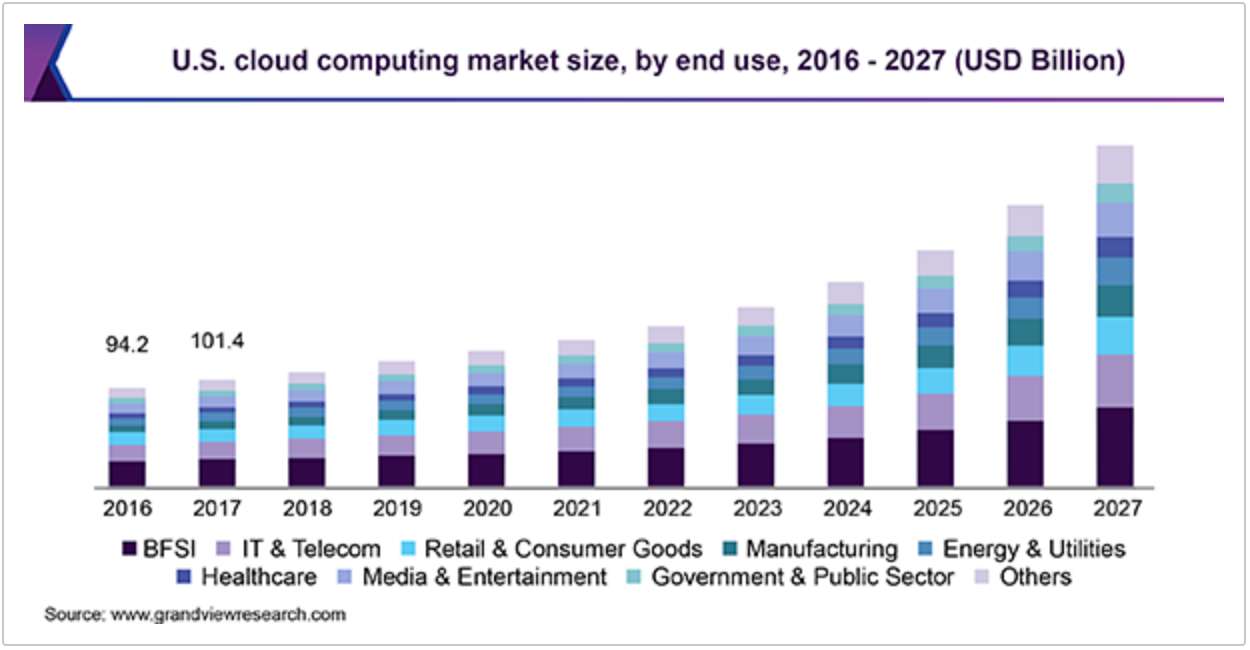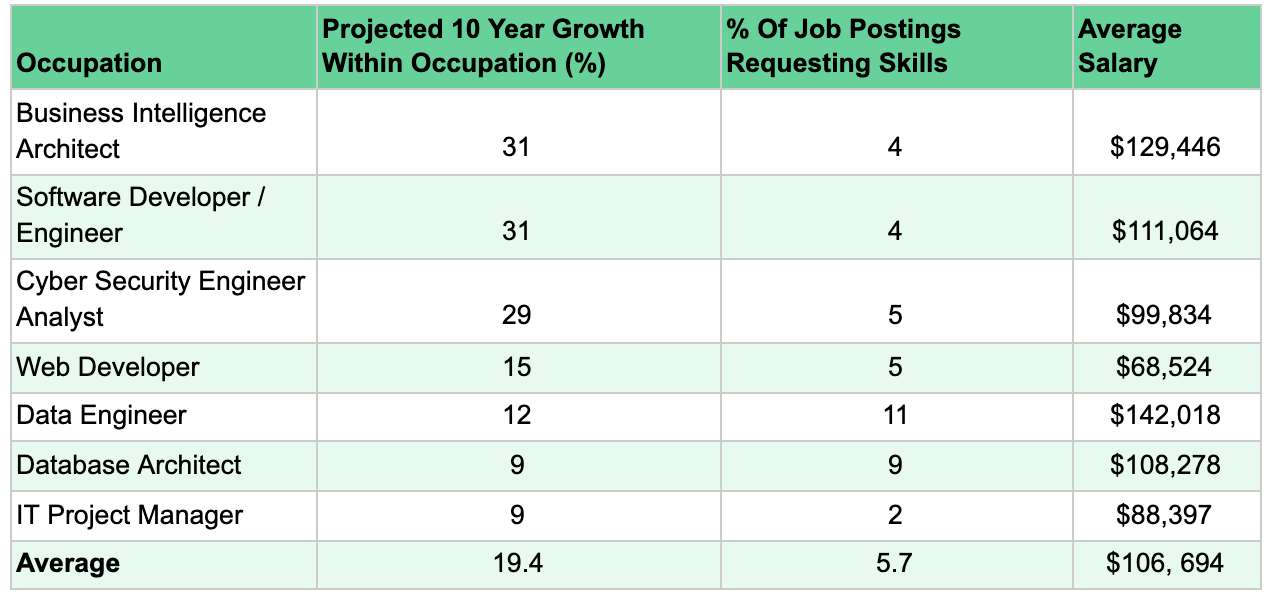Are you already versed in cloud computing and ready to land a job in the field? Stand out from other competition by utilizing a professional resume writing service to beat ATS. If you’ve had already had some interviews with no job offers, check out this interview guide to learn how to land your dream job.
Cloud computing is defined as “the practice of using a network of remote servers hosted on the internet to store, manage, and process data, rather than a local server or a personal computer.” A good example of cloud computing, and how we’ve migrated to it is word processing software. Microsoft Word used to be the standard (even if you had a Mac), but since the rise of cloud computing, the majority of people are now using Google Docs, because everything you write is automatically saved in the cloud and can be accessed from anywhere, by anybody you share a document with. This is far easier than the back and forth emailing of Word documents we started out with.
Cloud computing gained popularity in 2006 when Amazon released its Elastic Compute Cloud (EC2) and it was and has been the natural progression of things since the rise of the internet in the late ’90s.
There are three main types of cloud services:
- Software as a Service (SaaS). This is the majority of cloud computing that allows you to access data from anywhere.
- Platform as a Service (PaaS). Like SaaS, but for app development.
- Infrastructure as s Service (IaaS). The servers and networking associated with cloud computing.
Trends and Growth Of The Cloud Computing Industry
The industry is expected to grow at a rate of 15 percent annually, and this can be attributed to growing digital transformation among industries, rising penetration of internet and mobile devices across the world, and the increase in consumption of big data.

IT is unlike any other profession because you’re able to work in almost any industry you like. The more relevant skills and experience you possess, the more options you will have. The chart above is segmented by industry and goes left to right (in the key), and then bottom to top in the graph. So as illustrated, we can see that banking, financial services, and insurance (BFSI) has the highest expected rate of growth, followed by IT & Telecom, and so on, and so forth.
With steady growth like this, one can safely assume that there will be a significant increase in jobs available across the industry. For more information, check out our guide to tech careers.
The 7 Fastest-Growing Cloud Computing Jobs and Salary
The majority of cloud computing jobs have been and will continue to be in software engineering and development, which is what we are focusing on for the sake of this article. However, there will also be an increase in sales and marketing, and administrative jobs available as well.
Employment and advancement opportunities will easier to come by if you continue to specialize in cloud. Google, Microsoft Azure, and Amazon Web Services (AWS) are the three largest cloud providers for companies around the world and according to a report, keywords in job searches related to these services have risen 223 percent in the last three years.

Source: Dice
Business Intelligence Architect
Think CRM applications like Salesforce, file collaboration services like Dropbox, or help desk software like Zendesk. As more enterprises are relying on companies like these to grow, they are increasingly looking for Business Intelligence Architects who can analyze and process large amounts of data from dashboards, Key Performance Indicators (KPIs), and other analytics in order to make calculated decisions that will positively impact the direction of a company.
While companies of all sizes are shifting entirely to the cloud because of its speed, collaboration, and lower costs, the need for BI Analysts is going to skyrocket as the industry becomes, even more, mobile-centric and agile. Making educated decisions about the direction a company takes could potentially save or make it a lot of capital. Transversely, uneducated decisions could cost or lose a company a lot in the same respect.
Recommended education: bachelor’s degree in computer science, business, mathematics, economics, statistics, management, accounting or in a related field.
Software Developer / Engineer
It takes creative and technical minds to develop cloud infrastructure, and that’s precisely who cloud software engineers are, and what they do. Cloud engineers make determinations on how a system should operate, and work with the programmers who write the actual code. By overlooking the development of the cloud infrastructure, they are also tasked with designing newer, more agile systems, or making upgrades to existing ones.
Recommended education: bachelor's degree in computer science, although some employers may also consider those with degrees in mathematics or engineering.
Related: Software Engineer Resume
Cyber Security Engineer Analyst
Join The Break Community
The more data is floated into a cloud, the more susceptible it becomes to being breached. Therefore, security going into cloud-based platforms is becoming increasingly important. The same way developers and engineers are tasked with developing new systems for agility, cloud cybersecurity engineer analysts are tasked with developing and updating systems for user safety and security.
Cloud security engineers often work as part of a larger team in an office setting, and sometimes can get called in after hours to respond to security threats. They perform simulated “digital fire drills” to see how fast a company can respond to, and correct any malfeasance. Another part of the job is to work with programmers to either advocate or deter them from using certain types of code.
Recommended education: bachelor's degree in cybersecurity or security engineering.
Web Developer
Similar to a software engineer, a cloud web developer is responsible for writing code using a variety of different languages that could be used by a given company. Knowledge of one or a combination of HTML, CSS, and JavaScript in the client, PHP, ASP.NET (C#), Python, Go, or Java is what is often required. The cloud web developer will use these languages to design systems and solutions, write code, or debug existing issues within the cloud.
In theory, anyone with experience as a web developer could be a cloud web developer, however, pay is often commensurate, and highly valued with experience in the cloud industry.
Recommended education: associates degree.
Data Engineer
Above we learned that Business Intelligence Architects are responsible for analyzing data to help companies make more educated decisions on where to allocate their resources. Data Engineers are the ones responsible for collecting that data, finding trends in it, and developing algorithms to make it useful. A role like this “requires a significant set of technical skills, including a deep knowledge of SQL database design and multiple programming languages.” - cio.com
This position has morphed with the rise of cloud computing, and Data Engineers who now work with the cloud are often encouraged to obtain certification through Amazon Web Services (AWS) as they own and operate a majority of the market.
Either way, the landscape has shifted. Engineers who were once tasked with mining data with in-house excel sheets are now dealing with a number of different cloud-hosted datasets from different departments that all need to be brought together into a centralized analytics platform or other software systems. If you’re a Data Engineer and are thinking about getting into the cloud industry, we found a great article by Lio Fleishman that mitigates the transition.
Note: Google also offers a Professional Data Engineer certification.
Recommended education: bachelor's degree in computer science, software or computer engineering, applied math, physics, statistics, or a related field.
Database Architect
Also referred to as Technical Operations Vice President, Data Officer, Information Modeling Engineer Specialist, Database Architect, Information Technology Architect (IT Architect), Data Administrator, Database Consultant, System Engineer, Data Architect, or Information Architect.
Usually, at the enterprise level, companies seek out, and employ Database Architects to transition their data into the cloud while retaining their expertise to maintain it by working with departments in operations, programming, and security.
Recommended Education: bachelor's degree in computer science, information science, or similar fields. Larger firms might want people with master's degrees.
IT Project Manager
Cloud computing is usually one of many areas that IT Project Managers, or simply, Project Managers, work with. Like with every job on this list, the role has been affected by the introduction and popularity of cloud infrastructure in companies around the world. But it’s looked at as more of a welcomed change than a transition.
The introduction of the cloud has allowed Project Managers to focus more on planning, organizing, allocating resources, budgeting, and successfully executing organizations’ specific IT goals. Where they used to have to interface directly with onsite application developers, technical leads, and QA testers to deal with data storage, they now deal exclusively with external vendors. This has allowed companies to employ a leaner stable of Project Managers who now have more free time to focus on more relevant tasks and projects.
Here are the top three skills required of Project Managers dealing with cloud infrastructure according to the CEO of Cloudwards.net, Mauricio Prinzlau:
- Advanced financial and costing skills.
- A deep understanding of enterprise architecture.
- Vendor and contract negotiation.
Recommended education: bachelor's degree in computer science, information technology, or IT project management.
Computer Systems Engineer / Architect
There are also many different names for this title: System Architect, Systems Consultant, Electronic Data Interchange System Developer (EDI System Developer), Network and Infrastructure Engineer, Systems Engineer, Solution Architect, Architect, Information Technology Architect (IT Architect), Research Systems Architect, and Network Engineer.
The position requires someone to “design and develop solutions to complex applications problems, system administration issues, or network concerns. Perform systems management and integration functions.” - careeronestop.org. When dealing with, or specializing in the cloud, the engineer or architect is responsible for:
- Cloud adoption plans
- Cloud application design
- Cloud management and monitoring
- Support for application architecture
- Deployment in cloud environments
It is important for the professional to have a deep grasp of the cloud infrastructure as they will be implementing changes that directly impact a company and its employees.
Related: Best IT Certificates
Where to find cloud computing jobs
Check out our list of the best job posting sites to know where employers are actively posting.
Top Cloud Skills In Demand This Year
Bottom Line
Writing this article was peculiar because cloud computing has become so commonplace that we don’t even think of it as cloud computing, but simply using the computer or the internet. The two main takeaways of this article is that the industry is growing, along with the job prospects and you can start to tailor your experience to specialize in this corner of the IT realm.
It is also worth noting that the need for cloud computing has increased in a world riddled with uncertainty because of the pandemic. The entire corporate environment has changed, adapting to a more remote or hybrid work environment. This work remote mentality serves as even more evidence of a rapidly growing cloud economy.














